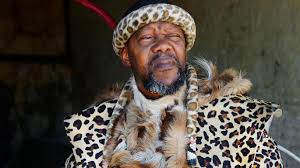Outspoken former Ntabazinduna Chief, Felix Nhlanhlayamangwe Ndiweni, with other Zimbabweans based in the diaspora are planning to engage 54 African parliaments, regional and international blocs to advocate for a diaspora vote.
Zimbabweans abroad have been clamouring for a diaspora vote, while the government insists, they can only enjoy that right while within the country’s borders. Chief Ndiweni pointed out that it was “utter nonsense to ask the diaspora to fly home to vote” when electronic voting has been going on for years now.
“Will the government pay their air fares and costs? No. So voting wherever you are is the way,” he said on his twitter account.
The United Kingdom-based Chief Ndiweni, who was ‘controversially’ removed from his position by the government, has visited the office of the UK Prime Minister at 10 Downing Street on a diaspora vote campaign.
“The diaspora vote campaign is done by Zimbabweans for Zimbabweans, who will now also be engaging the 54 African parliaments and the many political parties on the African Continent, for help and assistance in achieving it,” he said.
He said there were plans to also engage the Southern African Development Community (SADC, the African Union, Asia Block, South American countries, the European Union, United Nations including reaching out to China, Russia and Cuba.
“The diaspora vote is our last best hope of a proper break though to our Zimbabwean crisis,” said Chief Ndiweni, who indicated as a constitutional traditional leader, he was fulfilling his responsibilities with regards to democracy, rule of law, just like other chiefs who sit in the House of Senate in Zimbabwe.
He also underlined that the government had promised Zimbabweans the vote but had chosen not to honour that basic promise.
“ZANU-PF and ZAPU promised us the vote. No conditions attached. The Peace Commission has the promise written in bold letters. A promise to the people must be honoured and kept. War heroes died for this vote. It is unacceptable for the current government to break such a promise,” the chief said, noting Zimbabwean organisations were already driving the campaign forward.
Over the last 10 years there have been two High Court applications in Zimbabwe seeking a diaspora vote.
A regional challenge under the African Unions Human and peoples Charter was also filed, although the commission dismissed claims by some South African based Zimbabweans who argued the restrictions by the government on diaspora votes violated the African Charter.
Read: https://cite.org.zw/achpr-dismisses-diaspora-vote-case/
There have been other reported campaigns about the diaspora vote from Cape Town University, to London, to Washington DC in the United States.
Chief Ndiweni explained that Zimbabweans based in the diaspora did not need permission from the government to engage in diplomacy, as international relations could encourage the Zimbabwean government to allow the diaspora vote.
He argued that to have a law passed, one begins by engaging the government, advances to litigation then goes even further to international engagement.
“Three steps. We are at the third step – engagement,” he said.
“It is our human right. So we are just simply doing it. That is clear enough!”
“We cannot deny 5.5 million Zimbabweans plus their human right to cast a vote in a ballot box. What an arrogance for any Zimbabwean to deny another Zimbabwean their human right to vote. The very idea of a Zimbabwe Diaspora Vote seems to frighten the living daylights out of the government and its supporters. Why is that? They speak about so many things but are frightened to speak about the real reason why they do not want other Zimbabweans to vote. Strange.”
Chief Ndiweni said their campaign for the Zimbabwean Diaspora Vote was driven by faith, hope and belief of what Zimbabwe could be.
“The Zimbabwe Diaspora Vote looks very simple if not understood. It is simple yet powerful and profound. For there is no rational government that can reject the principle of the vote,” he said.
“As a people, the African Union has people’s rights next to human’s rights in the charter. It says if a member state does respect these rights, that state cannot use its ‘sovereign status’ to stop the people and other states interfering in that matter, for the people’s sake.”
The chief said Zimbabwe is a sovereign state within the African Union and must abide by the rules of the African Union organisation and the United Nations.
“Democracy is democracy. One cannot choose to accept one but and then leave out another bit. It is all or nothing,” he said.

